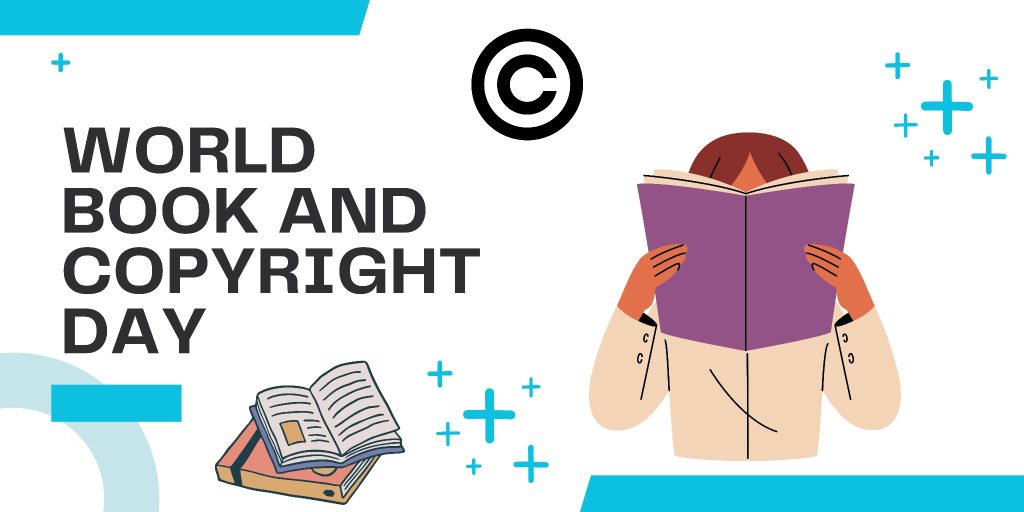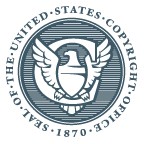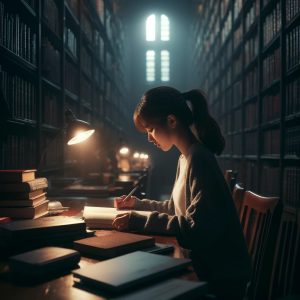 April 23rd is World Book and Copyright Day. Created by the United Nations Educational Scientific, and Cultural Organization or UNESCO, World Book and Copyright Day celebrates the written word, reading, and the publication process. World Book and Copyright Day honors the important role books have played in global history and everyday life. The holiday also recognizes copyright, the legal protection a creator is granted so they can control the use and disruption of their creative works. In addition to social media posts and support for literacy campaigns, UNESCO appoints a city to be the World Book Capital of the year. The World Book Capital is responsible for running programs and events that promote literacy. The Book Capital of 2024 will be Strasbourg, France (UNESCO). In honor of this commemorative day, let us look deeper into the definition of copyright, its history in the United States, and its future in the age of AI.
April 23rd is World Book and Copyright Day. Created by the United Nations Educational Scientific, and Cultural Organization or UNESCO, World Book and Copyright Day celebrates the written word, reading, and the publication process. World Book and Copyright Day honors the important role books have played in global history and everyday life. The holiday also recognizes copyright, the legal protection a creator is granted so they can control the use and disruption of their creative works. In addition to social media posts and support for literacy campaigns, UNESCO appoints a city to be the World Book Capital of the year. The World Book Capital is responsible for running programs and events that promote literacy. The Book Capital of 2024 will be Strasbourg, France (UNESCO). In honor of this commemorative day, let us look deeper into the definition of copyright, its history in the United States, and its future in the age of AI.
Definition of Copyright
Copyright is defined as a type of legal protection which allows a creator to limit the use of their tangible creations by other interested parties. (‘What is Copyright?). In the United States, copyright protects authors and creators by providing a legal status which can ensure their works are not used without their permission and/or compensation. Please note that copyright applies to a variety of creative works, not simply physical books. Creators in America can register their works online with the Copyright office at the Library of Congress.

History of Copyright
Copyright law has changed dramatically over the years. The earliest American law on copyright was passed by Congress in 1790 and gave authors exclusive rights to their works for only 14 years. Various legislative changes and court decisions have changed and expanded the scope of copyright. (Association of Research Libraries). For works published after 1978, copyright gives creators exclusive ownership for seventy years after their death. For works published before 1978, expansions of pre-existing laws provide copyright protection until 95 years after publication. That means that material published before 1929 are no longer protected by copyright and are part of the public domain! (Copyright Office, 2).
Fair Use
Another aspect of copyright relevant to educators and students is fair use. Fair use allows other parties to use and reproduce copyright material under limited circumstances. Determining what is fair use can be tricky. In broad terms, section 107 of the Copyright Act defines fair use as a limited portion of a copyrighted non-fiction work being used for non-profit purpose.(Fair Use). This provision of copyright law allows educators and students to access and use material for education purposes. Library services such as Interlibrary Loan and Course Reserves would be limited without the license provided by fair use.
Copyright and AI

AI and AI-created creative works are currently being debated by the Copyright Office. Should someone who has an AI program get the benefits of copyright or should copyright credit go to the AI program or the person who designed the AI program? The office’s current policy is to enforce the human requirement for a creation or work. The work has to be completed by a human in order to be considered for copyright registration. If the work is determined to be primarily the work of a computer, then the copyright office will decline to provide registration or only provide copyright coverage for the parts of the work completed by a human (Copyright Office, 3). The Copyright Office is currently undergoing an evaluation of their policies so expect some more binding guidelines in the near future.
This World Book and Copyright Day, celebrate by reading a new book, whether fiction, non-fiction, check out recent additions to works in the Public Domain including Disney’s Steamboat Willie and of course, stop by your local library (public or academic) to pick out your next great read!
Charles Gallagher is Research and Instruction Librarian at the Catholic University of America Libraries. His liaison responsibilities include the Departments of Biology, Chemistry, Computer Science, Mathematics, Physics, and the Schools of Engineering and Nursing.
Further reading
Benson, S. R. (2021). Compact copyright : quick answers to common questions. ALA Editions.
Benson, S. (Ed.). (2019). Copyright conversations : rights literacy in a digital world. Association of College & Research Libraries.
Copyright registration (Library of Congress. Copyright Office). (2017). U.S. Copyright Office.
References
Association of Research Libraries. N.d. Copyright Timeline: A History of Copyright in the United States.
Pennsylvania State University. 2022. Fair Use. https://copyright.psu.edu/copyright-basics/fair-use/
U.S. Copyright Office. N.d. What is Copyright? https://www.copyright.gov/what-is-copyright/
U.S. Copyright Office. 2023. Copyright and Artificial Intelligence. https://www.copyright.gov/ai/
UNESCO. World Book and Copyright Day. N.d. https://www.unesco.org/en/days/world-book-and-copyright
UNESCO. 2023. UNESCO names Strasbourg as World Book Capital for 2024. October 6th. https://www.unesco.org/en/articles/unesco-names-strasbourg-world-book-capital-2024
